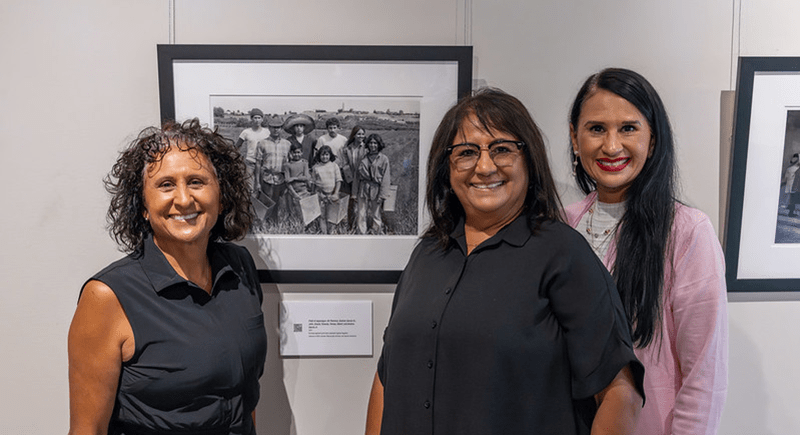
October 13, 2023 Photography exhibit at WSU Tri-Cities inspires connection to migrant farmworker history in the Yakima Valley
By Lacey Desserault
In recognition of Hispanic Heritage month, Washington State University (WSU) Tri-Cities hosted a multi-dimensional series of events that highlighted the lives of Yakima Valley farmworkers from the 1960s and 70s and their fight for improved working and living conditions. Using photography, guest speakers, film, and writing the WSU Tri-Cities campus community and the greater Tri-Cities region had the opportunity to experience, appreciate and celebrate the histories, cultures and contributions of those whose ancestors came from Spain, Mexico, the Caribbean and Central and South America. The events inspired connection, compassion, and understanding through shared memories and storytelling.
The centerpiece of the Hispanic Heritage month events was the exhibit, “Rooted: Irwin Nash Photographs of Yakima Valley Farmworkers”. Nash originally started taking the photos as part of a freelance magazine piece on Yakima Valley agriculture, but it turned into a deeper documentation of Chicano livelihood. Nash captured over 9,400 photographs between 1967 and 1976, which had been previously largely unknown, displayed scenes from the daily lives of the Yakima Valley farmworker community. The experiences, stories, and perspectives seen in the photos, inspired visitors to share their stories and help document previously undocumented histories.
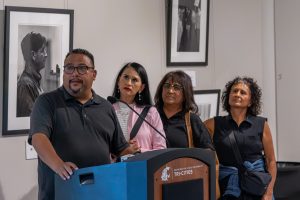
(L to R): Miguel Puente, Nora Gonzalez, Teresa Puente, and Yolanda Phillips speak about their family.
“The scenes captured through these photos reminded us of the enduring determination that defines the farmworkers’ resilience. Capturing the essence of these resilient farmworkers from 1967 to 1976 created a bridge from the past to the present, where we now reflect on the sacrifices made and the dreams we pursue. Not only did they work in the soil of the fields, but they planted seeds of a better future,” said Haydee Guzman, program coordinator for the Office of Student Engagement and Leadership and the driving force behind the exhibit and events.
The Nash exhibit and series of events was powerful for the WSU Tri-Cities campus, which is the most diverse campus within the WSU system. Approximately 50% of students identify as people of color, with of the majority of those identifying as Hispanic.
“Bringing the Irwin Nash photograph collection to the WSU Tri-Cities campus created an opportunity for us to understand the community we are a part of, the history of our region and, for many of us who are Latino/a/x, to understand our roots. As an extension of the exhibit, we were able to host knowledgeable speakers to educate us, share personal stories, and inspire us to act in compassion and in justice for the predominantly Latino/a/x families who continue to do the toughest jobs that contribute greatly to our region and society,” said Laura Sanchez, director of student services.
In addition to the Nash exhibit, WSU Tri-Cities hosted speakers, films, and writing events that encouraged learning, conversation, and reflection about migrant farmworkers and their contributions to the region.
Speaker Series
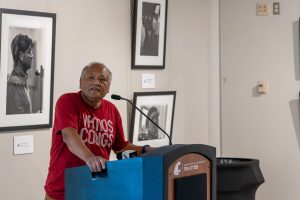
WSU Regent Enrique Cerna talks about his experiences.
Several community leaders who had connections to the photos in the Nash exhibit were invited to speak about migrant farmworker movements, culture, and experiences. These campus events allowed students, staff, faculty, and the community to share their personal experiences in relation to the photos, ask thought-provoking questions, and learn more about migrant farmworkers in the Yakima Valley.
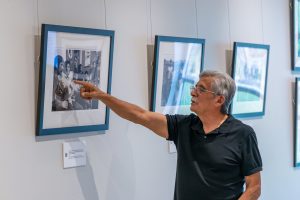
Human Rights Commissioner Lupe Gamboa points to familiar faces.
At a community reception, WSU Regent Enrique Cerna shared his personal experiences growing up in a farming family. The reception also brought together several families whose relatives were photographed and displayed in the gallery, establishing personal connections with the art.
Human rights commissioner and lifelong labor activist Lupe Gamboa presented his efforts in labor movements across the Yakima Valley, and how those movements impacted the future of farm labor. He shared a glimpse into the hard work and dedication that the movements required for implementing positive change.
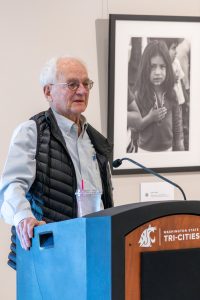
Superior Court Judge Michael Fox talks to students and staff.
Superior court judge and farmworker labor lawyer Michael Fox spoke with students and staff about his experiences in protests and trials that fought for farmworker labor rights. His dedication to the cause was evident as he spoke about the struggles and successes he faced from a legal perspective.
Film
Two films were shown as an opportunity to provide context to the gallery of photos and help individuals feel comfortable asking questions and participating in conversations about migrant farmworkers and the labor movements.
The first film was a recording of a keynote address celebrating National Farmworkers Awareness Week hosted by the College Assistance Migrant Program at WSU Pullman, titled “Amplifying the Voices of Farmworkers”, which shared the story of Dolores Huerta, a leader in the United for Farmworkers Rights movement. The lunch and learn event encouraged students to view the address and discuss the significance of the individuals that lead the movement and how they related to the people in the photos.
The second film titled “Cesar Chavez” centered around Chavez’s leadership and activism in advocating for farmworkers, and inspiring others to fight for positive change.
Writing
To promote personal reflections on the topics discussed and learned, students and staff were invited to participate in several writing sessions. The participants were encouraged to develop their own understanding of the lives of migrant farmworkers from the displayed photographs and reflect on how they relate to the people around them.
WSU Tri-Cities Counseling and Wellness hosted a poem writing session, which allowed participants to utilize a creative outlet for their emotions and thoughts surrounding the topic of migrant farmworkers.
Two reflective writing sessions were also hosted, one for students and one for staff and faculty, which encouraged attendees to express their questions and thoughts in a longer format and think creatively and freely about their personal connections to those in the photographs.
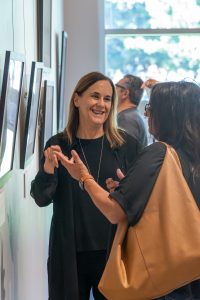
WSU Tri-Cities Chancellor Sandra Haynes talks with Teresa Puente.
The gallery of Nash’s photography was a meaningful and impactful addition to campus, providing understanding, connection, and conversation surrounding Yakima Valley farmworkers. Though the photos showed a glimpse of the harsh reality for many families, it also displayed the joy and pride of each family and the legacy they passed on to future generations. Many visitors were able to connect emotionally with individuals and scenes in the photos, and some even recognized family members and relatives within them.
“Credit and commendations are in order for WSU and Mr. Irwin Nash,” said Miguel Puente, who spoke at the Irwin Nash community gallery reception about his family’s connection to the photos. “The ‘Rooted: Irwin Nash Photographs of Yakima Valley Farmworkers’ provided a valuable glimpse into the lives of farmworkers. The natural and unscripted scenes captured in black and white are timeless and powerful illustrations of the important contributions and inspiration that farmworkers have always contributed but rarely are recognized for. The collection triggered fond memories and untold stories amongst relatives, friends, and total strangers on the rich history of farmworkers in our region and beyond.”
Joel Aleman, a student at WSU Tri-Cities, described the impactful connection he felt with the photos. “It’s inspiring to be reminded that, despite the hardships that we and our parents and even their parents have gone though, they toiled to get us to where we are now. I’m excited and determined to make sure that I leave a better path for those that come after me.”
Though the gallery was temporary for the WSU Tri-Cities campus, the WSU Libraries Digital Collections will continue to make viewing the photos accessible through their website.
View the photos featured in the WSU Tri-Cities gallery and more.




